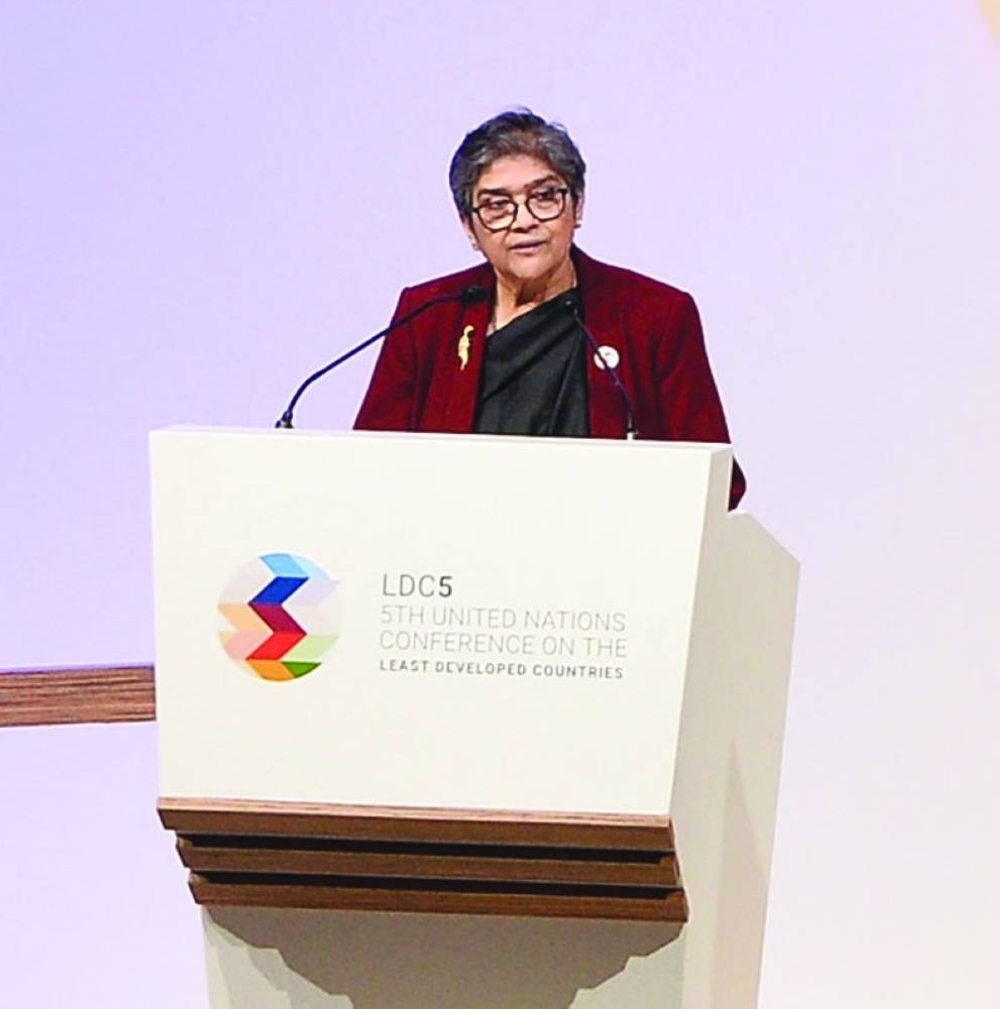The Doha Programme of Action (DPoA) has set a new target to enable additional 15 least developed countries to meet the graduation criteria by the end of this decade, a senior official noted Sunday.
Speaking at a session of the fifth UN Summit of the Least Developed Countries (LDC5), Rabab Fatima, high representative for the Least Developed Countries, Landlocked Developing Countries and Small Island Developing States and the secretary-general of LDC5, said the UN formally recognised the LDCs in 1970 and a list was approved the next year.
“This marked the beginning of the partnership between the LDCs and the developed partners. The conference happening in every decade has a common objective to put global attention on the most vulnerable countries. At the outset, there were only 25 LDCs and it peaked to 52 in 1991,” said Fatima.
The official stressed that the delegates have gathered in Doha with the renewed determination to provide every person in every LDC a fair chance to succeed in life.
“The Istanbul Programme of Action for the decade 2011-2022 set an ambitious target to graduate half of the LDCs by 2020. Although the target was not reached, remarkable progress was made. Four LDCs graduated in the time period and 15 more are in the pipeline for graduation. DPoA has set a new target to enable additional 15 countries to meet the graduation criteria by the end of this decade,” the official explained.
She pointed out that progress took place in some other areas, too. “ In 1980, the average GDP growth in the LDCs was 3.1%, which reached 7.4% in 2005. However, it fell to 1.9% in 2021 due to the impact of Covid-19. From $284 in 1980, the GDP per capita of the LDCs reached $1,150 in 2021 and the total share of exports increased from 0.52% in 1990 to 1% now,” Fatima said.
“Each one of these data represents real lives and livelihoods, hopes, dreams and opportunities. Although progress was made, it remains uneven within the group. Many LDCs, especially those in Africa, continue to face systemic challenges. And the inequalities between the developed world and the LDCs have further widened. The technological innovations and unfavourable global economic conditions have made the situation worse,” she lamented.
According to Fatima, over 69% of the worldwide deaths caused by climate-induced disasters occurred in the LDCs. “And yet, the LDCs account for only 1.1% of the global emissions. Historically, the rules of development were stacked unfairly against the LDCs. Covid-19, conflicts in different part of the world and the cascading food impact and financial crisis are all affecting the LDCs most disproportionately.
"These overlapping crises have severally impacted the LDCs and delayed their journey towards achieving the 2030 agenda,” she noted.
“Despite all the challenges, we arrive in Doha with the hope that solidarity will have its stay. Addressing the challenges of the LDCs is not a moral imperative but an economic and political one, too. We have come to the Doha conference with the DPoA already adopted in 2022 and in implementation for over a year. If we can bring to fruition the commitments, targets and the deliverables of the DPoA, we can put the LDCs to transformative journey towards rapid economic growth and sustainable development,” Fatima added.

Rabab Fatima speaking at the event. PICTURE: Shaji Kayamkulam

